Social Entrepreneurship: Business Ethics and Social Impact
VerifiedAdded on 2022/10/04
|7
|1642
|324
Essay
AI Summary
This essay delves into the multifaceted realm of social entrepreneurship, examining its core principles and ethical dimensions. It explores the role of social entrepreneurs in addressing societal issues, contrasting their approach with traditional business models and corporate social responsibility (CSR). The essay highlights the importance of ethical considerations, social innovation, and the pursuit of social impact. It discusses various types of social enterprises and their contributions to community development and environmental sustainability. The analysis includes the application of ethical theories, such as utilitarianism, to evaluate the actions of entrepreneurs and organizations. Furthermore, the essay emphasizes the need for businesses to integrate social entrepreneurship principles, promoting positive societal contributions and addressing cultural and social issues. The conclusion reinforces the significance of social innovation and ethical practices in fostering growth, prosperity, and a better quality of life for all.
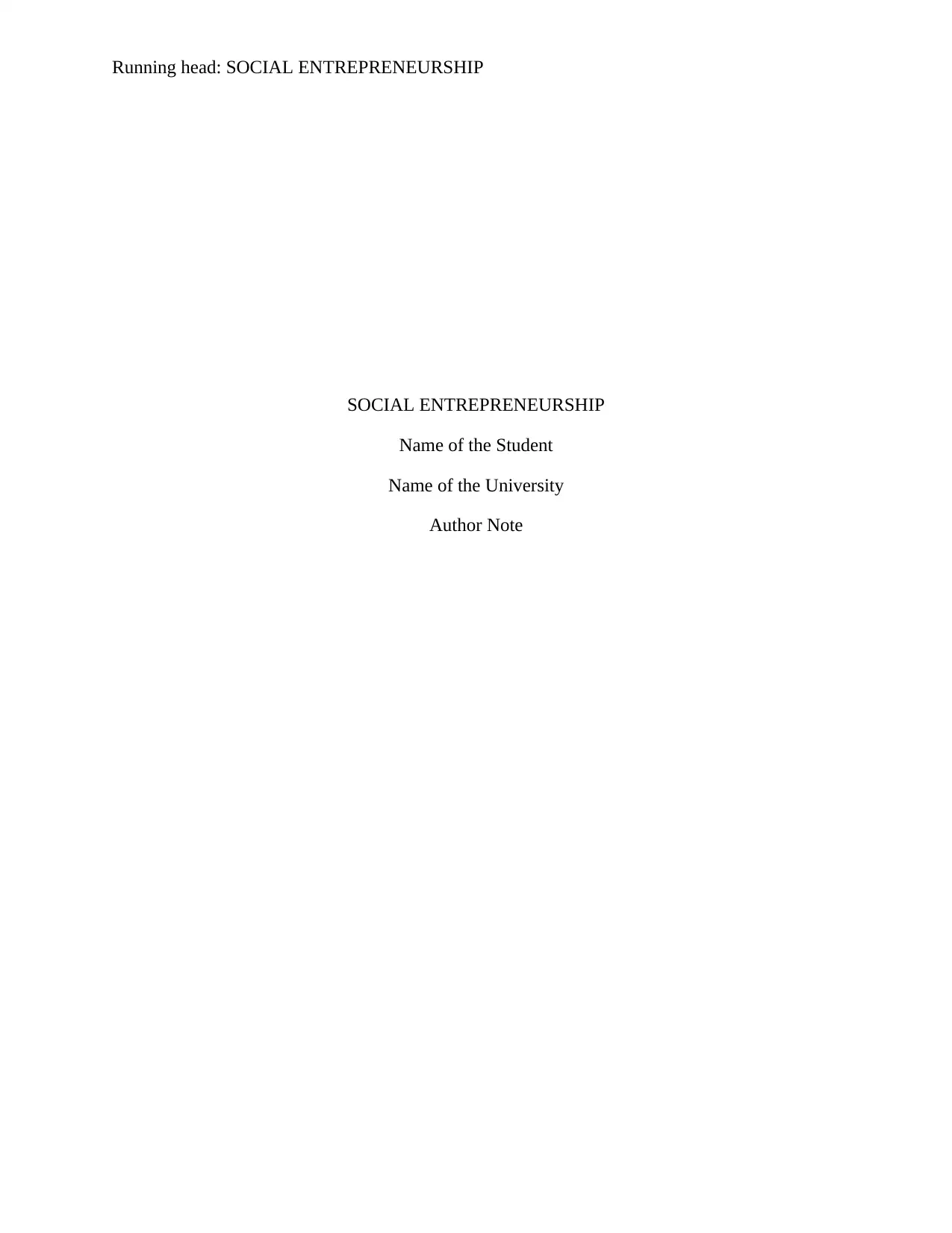
Running head: SOCIAL ENTREPRENEURSHIP
SOCIAL ENTREPRENEURSHIP
Name of the Student
Name of the University
Author Note
SOCIAL ENTREPRENEURSHIP
Name of the Student
Name of the University
Author Note
Paraphrase This Document
Need a fresh take? Get an instant paraphrase of this document with our AI Paraphraser
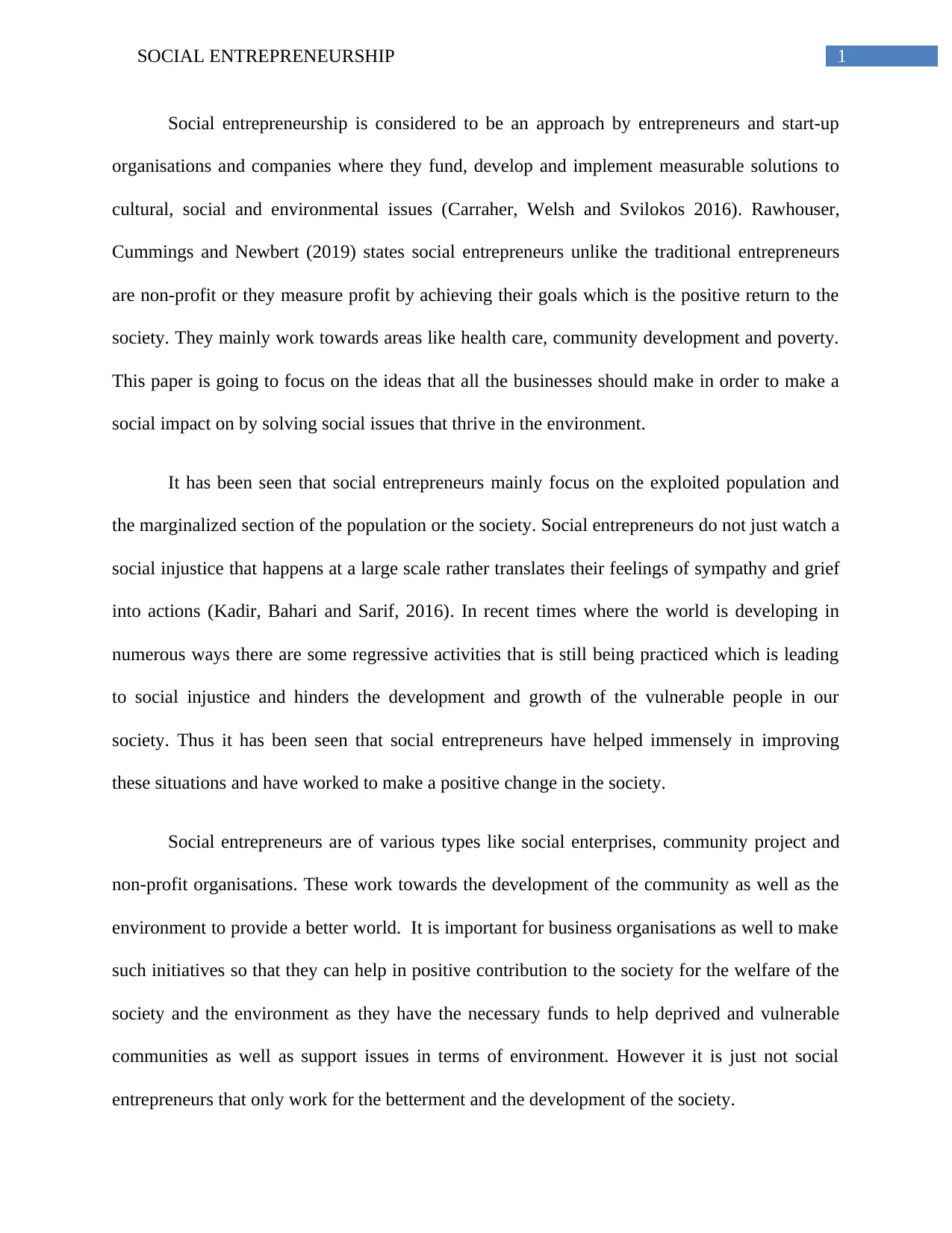
1SOCIAL ENTREPRENEURSHIP
Social entrepreneurship is considered to be an approach by entrepreneurs and start-up
organisations and companies where they fund, develop and implement measurable solutions to
cultural, social and environmental issues (Carraher, Welsh and Svilokos 2016). Rawhouser,
Cummings and Newbert (2019) states social entrepreneurs unlike the traditional entrepreneurs
are non-profit or they measure profit by achieving their goals which is the positive return to the
society. They mainly work towards areas like health care, community development and poverty.
This paper is going to focus on the ideas that all the businesses should make in order to make a
social impact on by solving social issues that thrive in the environment.
It has been seen that social entrepreneurs mainly focus on the exploited population and
the marginalized section of the population or the society. Social entrepreneurs do not just watch a
social injustice that happens at a large scale rather translates their feelings of sympathy and grief
into actions (Kadir, Bahari and Sarif, 2016). In recent times where the world is developing in
numerous ways there are some regressive activities that is still being practiced which is leading
to social injustice and hinders the development and growth of the vulnerable people in our
society. Thus it has been seen that social entrepreneurs have helped immensely in improving
these situations and have worked to make a positive change in the society.
Social entrepreneurs are of various types like social enterprises, community project and
non-profit organisations. These work towards the development of the community as well as the
environment to provide a better world. It is important for business organisations as well to make
such initiatives so that they can help in positive contribution to the society for the welfare of the
society and the environment as they have the necessary funds to help deprived and vulnerable
communities as well as support issues in terms of environment. However it is just not social
entrepreneurs that only work for the betterment and the development of the society.
Social entrepreneurship is considered to be an approach by entrepreneurs and start-up
organisations and companies where they fund, develop and implement measurable solutions to
cultural, social and environmental issues (Carraher, Welsh and Svilokos 2016). Rawhouser,
Cummings and Newbert (2019) states social entrepreneurs unlike the traditional entrepreneurs
are non-profit or they measure profit by achieving their goals which is the positive return to the
society. They mainly work towards areas like health care, community development and poverty.
This paper is going to focus on the ideas that all the businesses should make in order to make a
social impact on by solving social issues that thrive in the environment.
It has been seen that social entrepreneurs mainly focus on the exploited population and
the marginalized section of the population or the society. Social entrepreneurs do not just watch a
social injustice that happens at a large scale rather translates their feelings of sympathy and grief
into actions (Kadir, Bahari and Sarif, 2016). In recent times where the world is developing in
numerous ways there are some regressive activities that is still being practiced which is leading
to social injustice and hinders the development and growth of the vulnerable people in our
society. Thus it has been seen that social entrepreneurs have helped immensely in improving
these situations and have worked to make a positive change in the society.
Social entrepreneurs are of various types like social enterprises, community project and
non-profit organisations. These work towards the development of the community as well as the
environment to provide a better world. It is important for business organisations as well to make
such initiatives so that they can help in positive contribution to the society for the welfare of the
society and the environment as they have the necessary funds to help deprived and vulnerable
communities as well as support issues in terms of environment. However it is just not social
entrepreneurs that only work for the betterment and the development of the society.
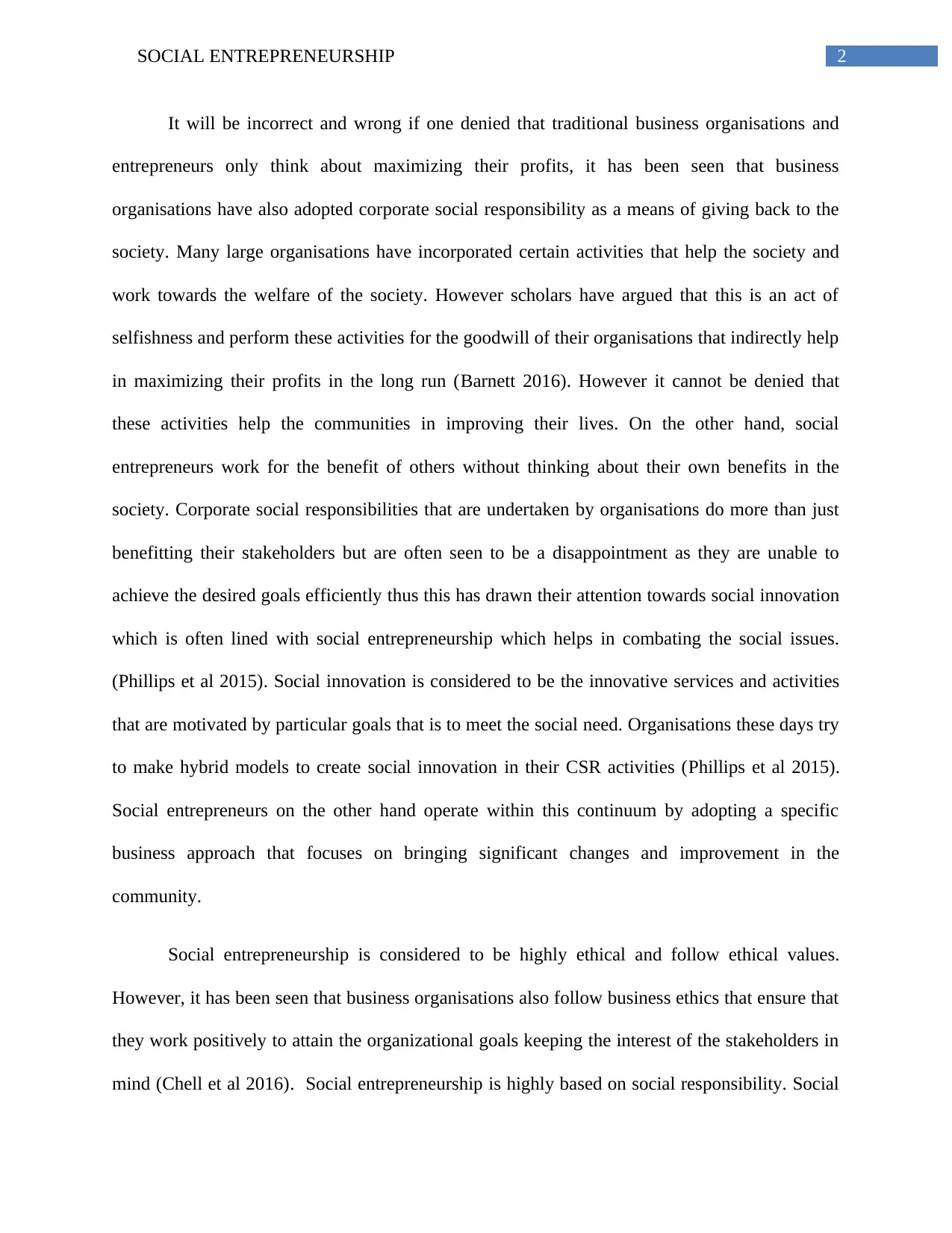
2SOCIAL ENTREPRENEURSHIP
It will be incorrect and wrong if one denied that traditional business organisations and
entrepreneurs only think about maximizing their profits, it has been seen that business
organisations have also adopted corporate social responsibility as a means of giving back to the
society. Many large organisations have incorporated certain activities that help the society and
work towards the welfare of the society. However scholars have argued that this is an act of
selfishness and perform these activities for the goodwill of their organisations that indirectly help
in maximizing their profits in the long run (Barnett 2016). However it cannot be denied that
these activities help the communities in improving their lives. On the other hand, social
entrepreneurs work for the benefit of others without thinking about their own benefits in the
society. Corporate social responsibilities that are undertaken by organisations do more than just
benefitting their stakeholders but are often seen to be a disappointment as they are unable to
achieve the desired goals efficiently thus this has drawn their attention towards social innovation
which is often lined with social entrepreneurship which helps in combating the social issues.
(Phillips et al 2015). Social innovation is considered to be the innovative services and activities
that are motivated by particular goals that is to meet the social need. Organisations these days try
to make hybrid models to create social innovation in their CSR activities (Phillips et al 2015).
Social entrepreneurs on the other hand operate within this continuum by adopting a specific
business approach that focuses on bringing significant changes and improvement in the
community.
Social entrepreneurship is considered to be highly ethical and follow ethical values.
However, it has been seen that business organisations also follow business ethics that ensure that
they work positively to attain the organizational goals keeping the interest of the stakeholders in
mind (Chell et al 2016). Social entrepreneurship is highly based on social responsibility. Social
It will be incorrect and wrong if one denied that traditional business organisations and
entrepreneurs only think about maximizing their profits, it has been seen that business
organisations have also adopted corporate social responsibility as a means of giving back to the
society. Many large organisations have incorporated certain activities that help the society and
work towards the welfare of the society. However scholars have argued that this is an act of
selfishness and perform these activities for the goodwill of their organisations that indirectly help
in maximizing their profits in the long run (Barnett 2016). However it cannot be denied that
these activities help the communities in improving their lives. On the other hand, social
entrepreneurs work for the benefit of others without thinking about their own benefits in the
society. Corporate social responsibilities that are undertaken by organisations do more than just
benefitting their stakeholders but are often seen to be a disappointment as they are unable to
achieve the desired goals efficiently thus this has drawn their attention towards social innovation
which is often lined with social entrepreneurship which helps in combating the social issues.
(Phillips et al 2015). Social innovation is considered to be the innovative services and activities
that are motivated by particular goals that is to meet the social need. Organisations these days try
to make hybrid models to create social innovation in their CSR activities (Phillips et al 2015).
Social entrepreneurs on the other hand operate within this continuum by adopting a specific
business approach that focuses on bringing significant changes and improvement in the
community.
Social entrepreneurship is considered to be highly ethical and follow ethical values.
However, it has been seen that business organisations also follow business ethics that ensure that
they work positively to attain the organizational goals keeping the interest of the stakeholders in
mind (Chell et al 2016). Social entrepreneurship is highly based on social responsibility. Social
⊘ This is a preview!⊘
Do you want full access?
Subscribe today to unlock all pages.

Trusted by 1+ million students worldwide
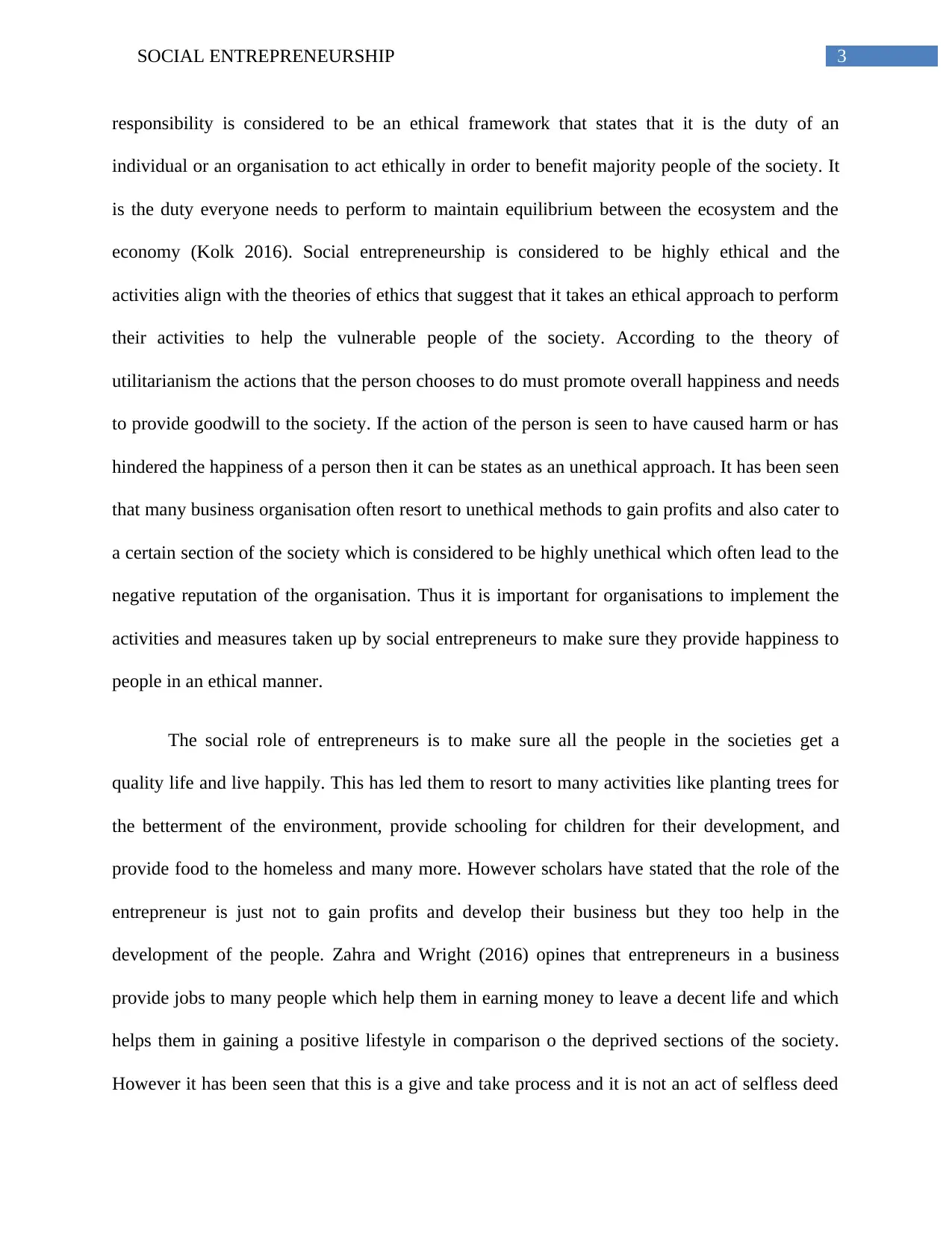
3SOCIAL ENTREPRENEURSHIP
responsibility is considered to be an ethical framework that states that it is the duty of an
individual or an organisation to act ethically in order to benefit majority people of the society. It
is the duty everyone needs to perform to maintain equilibrium between the ecosystem and the
economy (Kolk 2016). Social entrepreneurship is considered to be highly ethical and the
activities align with the theories of ethics that suggest that it takes an ethical approach to perform
their activities to help the vulnerable people of the society. According to the theory of
utilitarianism the actions that the person chooses to do must promote overall happiness and needs
to provide goodwill to the society. If the action of the person is seen to have caused harm or has
hindered the happiness of a person then it can be states as an unethical approach. It has been seen
that many business organisation often resort to unethical methods to gain profits and also cater to
a certain section of the society which is considered to be highly unethical which often lead to the
negative reputation of the organisation. Thus it is important for organisations to implement the
activities and measures taken up by social entrepreneurs to make sure they provide happiness to
people in an ethical manner.
The social role of entrepreneurs is to make sure all the people in the societies get a
quality life and live happily. This has led them to resort to many activities like planting trees for
the betterment of the environment, provide schooling for children for their development, and
provide food to the homeless and many more. However scholars have stated that the role of the
entrepreneur is just not to gain profits and develop their business but they too help in the
development of the people. Zahra and Wright (2016) opines that entrepreneurs in a business
provide jobs to many people which help them in earning money to leave a decent life and which
helps them in gaining a positive lifestyle in comparison o the deprived sections of the society.
However it has been seen that this is a give and take process and it is not an act of selfless deed
responsibility is considered to be an ethical framework that states that it is the duty of an
individual or an organisation to act ethically in order to benefit majority people of the society. It
is the duty everyone needs to perform to maintain equilibrium between the ecosystem and the
economy (Kolk 2016). Social entrepreneurship is considered to be highly ethical and the
activities align with the theories of ethics that suggest that it takes an ethical approach to perform
their activities to help the vulnerable people of the society. According to the theory of
utilitarianism the actions that the person chooses to do must promote overall happiness and needs
to provide goodwill to the society. If the action of the person is seen to have caused harm or has
hindered the happiness of a person then it can be states as an unethical approach. It has been seen
that many business organisation often resort to unethical methods to gain profits and also cater to
a certain section of the society which is considered to be highly unethical which often lead to the
negative reputation of the organisation. Thus it is important for organisations to implement the
activities and measures taken up by social entrepreneurs to make sure they provide happiness to
people in an ethical manner.
The social role of entrepreneurs is to make sure all the people in the societies get a
quality life and live happily. This has led them to resort to many activities like planting trees for
the betterment of the environment, provide schooling for children for their development, and
provide food to the homeless and many more. However scholars have stated that the role of the
entrepreneur is just not to gain profits and develop their business but they too help in the
development of the people. Zahra and Wright (2016) opines that entrepreneurs in a business
provide jobs to many people which help them in earning money to leave a decent life and which
helps them in gaining a positive lifestyle in comparison o the deprived sections of the society.
However it has been seen that this is a give and take process and it is not an act of selfless deed
Paraphrase This Document
Need a fresh take? Get an instant paraphrase of this document with our AI Paraphraser
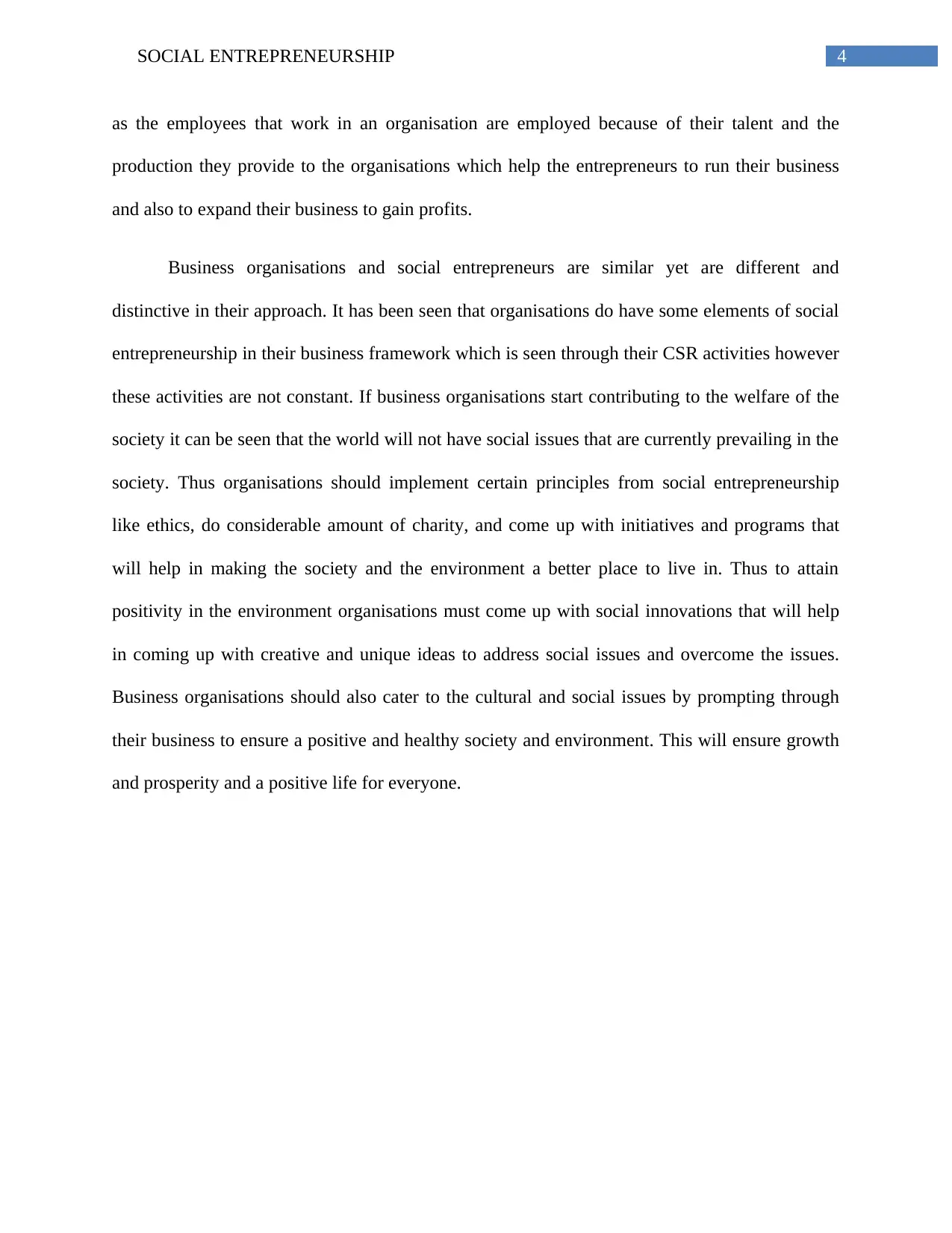
4SOCIAL ENTREPRENEURSHIP
as the employees that work in an organisation are employed because of their talent and the
production they provide to the organisations which help the entrepreneurs to run their business
and also to expand their business to gain profits.
Business organisations and social entrepreneurs are similar yet are different and
distinctive in their approach. It has been seen that organisations do have some elements of social
entrepreneurship in their business framework which is seen through their CSR activities however
these activities are not constant. If business organisations start contributing to the welfare of the
society it can be seen that the world will not have social issues that are currently prevailing in the
society. Thus organisations should implement certain principles from social entrepreneurship
like ethics, do considerable amount of charity, and come up with initiatives and programs that
will help in making the society and the environment a better place to live in. Thus to attain
positivity in the environment organisations must come up with social innovations that will help
in coming up with creative and unique ideas to address social issues and overcome the issues.
Business organisations should also cater to the cultural and social issues by prompting through
their business to ensure a positive and healthy society and environment. This will ensure growth
and prosperity and a positive life for everyone.
as the employees that work in an organisation are employed because of their talent and the
production they provide to the organisations which help the entrepreneurs to run their business
and also to expand their business to gain profits.
Business organisations and social entrepreneurs are similar yet are different and
distinctive in their approach. It has been seen that organisations do have some elements of social
entrepreneurship in their business framework which is seen through their CSR activities however
these activities are not constant. If business organisations start contributing to the welfare of the
society it can be seen that the world will not have social issues that are currently prevailing in the
society. Thus organisations should implement certain principles from social entrepreneurship
like ethics, do considerable amount of charity, and come up with initiatives and programs that
will help in making the society and the environment a better place to live in. Thus to attain
positivity in the environment organisations must come up with social innovations that will help
in coming up with creative and unique ideas to address social issues and overcome the issues.
Business organisations should also cater to the cultural and social issues by prompting through
their business to ensure a positive and healthy society and environment. This will ensure growth
and prosperity and a positive life for everyone.
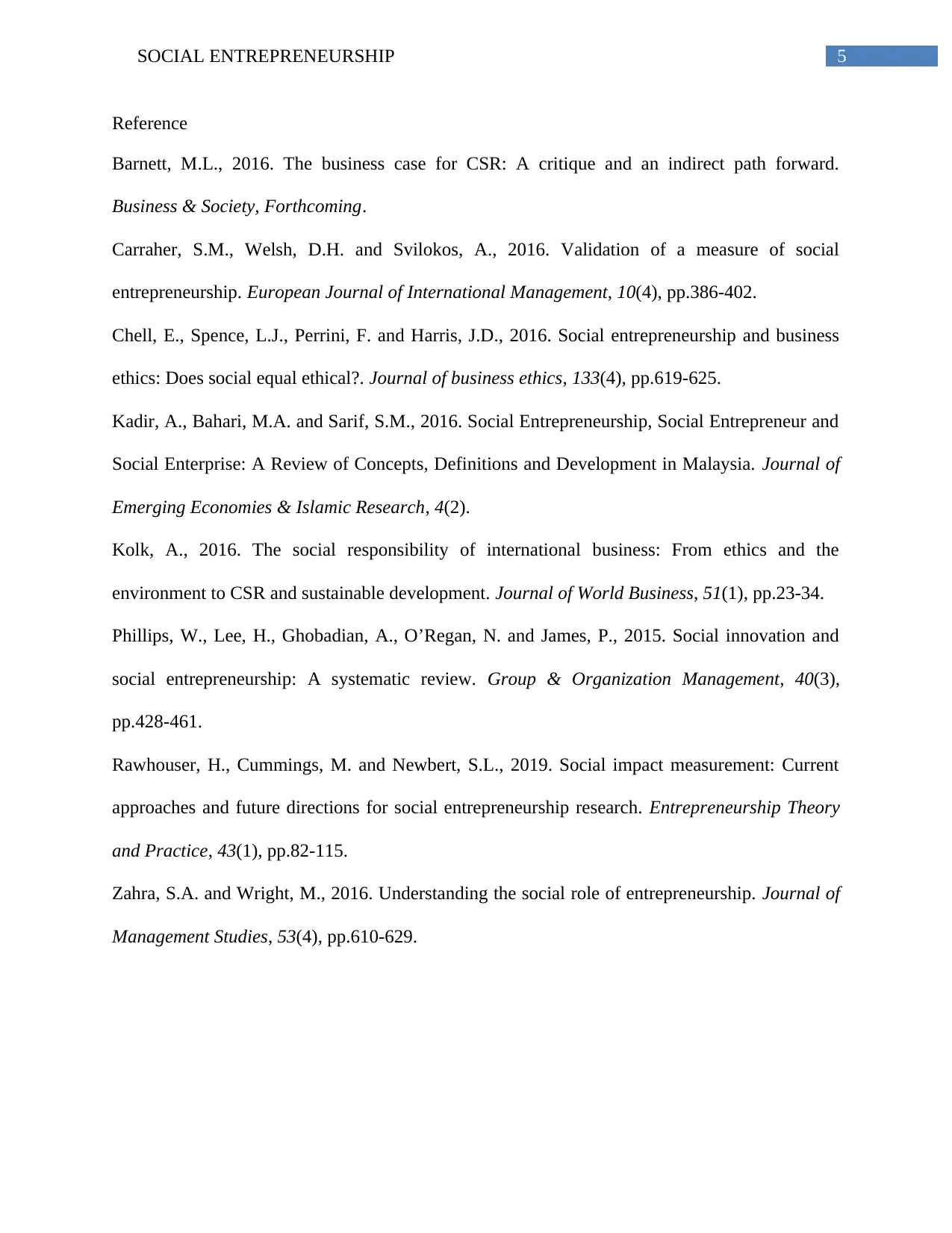
5SOCIAL ENTREPRENEURSHIP
Reference
Barnett, M.L., 2016. The business case for CSR: A critique and an indirect path forward.
Business & Society, Forthcoming.
Carraher, S.M., Welsh, D.H. and Svilokos, A., 2016. Validation of a measure of social
entrepreneurship. European Journal of International Management, 10(4), pp.386-402.
Chell, E., Spence, L.J., Perrini, F. and Harris, J.D., 2016. Social entrepreneurship and business
ethics: Does social equal ethical?. Journal of business ethics, 133(4), pp.619-625.
Kadir, A., Bahari, M.A. and Sarif, S.M., 2016. Social Entrepreneurship, Social Entrepreneur and
Social Enterprise: A Review of Concepts, Definitions and Development in Malaysia. Journal of
Emerging Economies & Islamic Research, 4(2).
Kolk, A., 2016. The social responsibility of international business: From ethics and the
environment to CSR and sustainable development. Journal of World Business, 51(1), pp.23-34.
Phillips, W., Lee, H., Ghobadian, A., O’Regan, N. and James, P., 2015. Social innovation and
social entrepreneurship: A systematic review. Group & Organization Management, 40(3),
pp.428-461.
Rawhouser, H., Cummings, M. and Newbert, S.L., 2019. Social impact measurement: Current
approaches and future directions for social entrepreneurship research. Entrepreneurship Theory
and Practice, 43(1), pp.82-115.
Zahra, S.A. and Wright, M., 2016. Understanding the social role of entrepreneurship. Journal of
Management Studies, 53(4), pp.610-629.
Reference
Barnett, M.L., 2016. The business case for CSR: A critique and an indirect path forward.
Business & Society, Forthcoming.
Carraher, S.M., Welsh, D.H. and Svilokos, A., 2016. Validation of a measure of social
entrepreneurship. European Journal of International Management, 10(4), pp.386-402.
Chell, E., Spence, L.J., Perrini, F. and Harris, J.D., 2016. Social entrepreneurship and business
ethics: Does social equal ethical?. Journal of business ethics, 133(4), pp.619-625.
Kadir, A., Bahari, M.A. and Sarif, S.M., 2016. Social Entrepreneurship, Social Entrepreneur and
Social Enterprise: A Review of Concepts, Definitions and Development in Malaysia. Journal of
Emerging Economies & Islamic Research, 4(2).
Kolk, A., 2016. The social responsibility of international business: From ethics and the
environment to CSR and sustainable development. Journal of World Business, 51(1), pp.23-34.
Phillips, W., Lee, H., Ghobadian, A., O’Regan, N. and James, P., 2015. Social innovation and
social entrepreneurship: A systematic review. Group & Organization Management, 40(3),
pp.428-461.
Rawhouser, H., Cummings, M. and Newbert, S.L., 2019. Social impact measurement: Current
approaches and future directions for social entrepreneurship research. Entrepreneurship Theory
and Practice, 43(1), pp.82-115.
Zahra, S.A. and Wright, M., 2016. Understanding the social role of entrepreneurship. Journal of
Management Studies, 53(4), pp.610-629.
⊘ This is a preview!⊘
Do you want full access?
Subscribe today to unlock all pages.

Trusted by 1+ million students worldwide

6SOCIAL ENTREPRENEURSHIP
1 out of 7
Related Documents
Your All-in-One AI-Powered Toolkit for Academic Success.
+13062052269
info@desklib.com
Available 24*7 on WhatsApp / Email
![[object Object]](/_next/static/media/star-bottom.7253800d.svg)
Unlock your academic potential
Copyright © 2020–2025 A2Z Services. All Rights Reserved. Developed and managed by ZUCOL.





